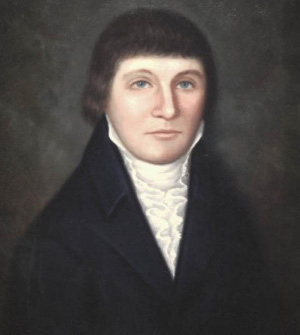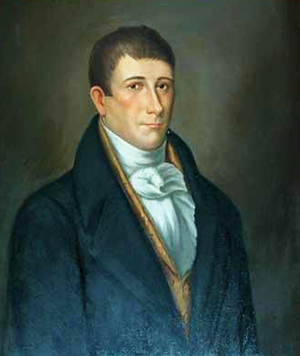
Richard Caswell was an American politician and lawyer who served as the first and fifth governor of the U.S. state of North Carolina from 1776 to 1780 and from 1785 to 1787. He also served as a senior officer of militia in the Southern theater of the American Revolutionary War. As a delegate to the First Continental Congress, he was a signatory of the 1774 Continental Association.

The Province of North Carolina, originally known as Albemarle Province, was a proprietary colony and later royal colony of Great Britain that existed in North America from 1712 to 1776.(p. 80) It was one of the five Southern colonies and one of the thirteen American colonies. The monarch of Great Britain was represented by the Governor of North Carolina, until the colonies declared independence on July 4, 1776.

Benjamin Williams was the 11th and 14th Governor of the U.S. state of North Carolina, from 1799 to 1802 and from 1807 to 1808. He was the first of two North Carolina Governors since the American Revolution to serve nonconsecutive terms.

Samuel Johnston was an American planter, lawyer, Grand Master of Freemasons, slave holder, and statesman from Chowan County, North Carolina. He represented North Carolina in both the Continental Congress and the United States Senate, and he was the sixth Governor of North Carolina.
Joseph Jones was a member of the Province of North Carolina House of Burgesses, First North Carolina Provincial Congress, and North Carolina State Senate.

Allen Jones was an American planter, American Revolution brigadier general of the Halifax District Brigade, and statesman from Edgecombe County, North Carolina.

Colonel Hezekiah Spruill was an early planter, a member of the North Carolina Provincial Congress and a Captain in the 2nd Battalion of militia in North Carolina. He was the grandson of Dr. Godfrey Spruill, the patriarch of the Spruill family in the United States and the first doctor in North Carolina.
Benjamin Spruill was a member of the Province of North Carolina House of Burgesses and North Carolina General Assembly of 1779, representing Tyrrell County.
William Thompson was the Senator for Carteret County in the North Carolina General Assembly of 1778 and 1779. He was also a colonel and commander of the Carteret County Regiment of the North Carolina militia during the American Revolution.

The North Carolina Provincial Congress was an extralegal representative assembly patterned after the colonial lower house that existed in North Carolina from 1774 to 1776. It led the transition from British provincial to U.S. state government in North Carolina. It established a revolutionary government, issued bills of credit to finance the provincial government, provided for the common defense, and adopted the state's first constitution.
John Harvey was a legislative leader in the Province of North Carolina and subsequently a leader in the creation of the revolutionary movement in the province.
The Salisbury District of North Carolina, was originally one of six colonial judicial districts established in 1766 by the Governor William Tryon of the Province of North Carolina. Immediately preceding the onset of the American War of Independence in 1775, these six regions were renamed "military districts" by the North Carolina Provincial Congress and used for organizing the North Carolina militia. The other military districts were Edenton, Halifax, Hillsborough, New Bern, and Wilmington districts. The military district designation was discontinued in 1835 during the North Carolina Constitution Convention.
The Edenton District Brigade was an administrative division of the North Carolina militia during the American Revolutionary War (1776–1783). This unit was established by the North Carolina Provincial Congress on May 4, 1776, and disbanded at the end of the war.
William Person was a planter, member of the colonial assembly of the Province of North Carolina (1771-1774), Revolutionary War Colonel, and commander of the Bute County Regiment of the North Carolina militia (1775-1776).

The Fifth North Carolina Provincial Congress was the last of five extra-legal unicameral bodies that met beginning in the summer of 1774. They were modeled after the colonial lower house. These congresses created a government structure, issued bills of credit to pay for the movement, organized an army for defense, wrote a constitution and bill of rights that established the state of North Carolina, and elected their first acting governor in the fifth congress that met in 1776. These congresses paved the way for the first meeting of the North Carolina General Assembly on April 7, 1777 in New Bern, North Carolina. The Fifth Congress met in Halifax from November 12 to December 23, 1776. Richard Caswell served as president, with Cornelius Harnett as vice-president.

The Third North Carolina Provincial Congress was the third of five extra-legal unicameral bodies that met between 1774 and 1776 in North Carolina. They were modeled after the colonial lower house. These congresses created a government structure, issued bills of credit to pay for the movement, and organized an army for defense, in preparation for the state of North Carolina. These congresses paved the way for the first meeting of the North Carolina General Assembly on April 7, 1777 in New Bern, North Carolina.
The Second North Carolina Provincial Congress was the second extra-legal unicameral body of the North Carolina Provincial Congress that met beginning in 1774. They were modeled after the colonial lower house. These congresses created a government structure, issued bills of credit to pay for the movement, and organized an army for defense, in preparation for the state of North Carolina. These congresses paved the way for the first meeting of the North Carolina General Assembly on April 7, 1777 in New Bern, North Carolina. The second Congress met in New Bern from April 3 to April 7, 1775.
The Fourth North Carolina Provincial Congress was one of five extra-legal unicameral bodies that met beginning in the summer of 1774 through 1776. They were modeled after the colonial lower house. These congresses created a government structure, issued bills of credit to pay for the movement, organized an army for defense, wrote a constitution and bill of rights that established the state of North Carolina, and elected their first acting governor in the fifth congress that met in 1776. These congresses paved the way for the first meeting of the North Carolina General Assembly on April 7, 1777 in New Bern, North Carolina. The Fourth Congress met in Halifax from April 4 to May 14, 1776. Samuel Johnston served as president, with Allen Jones as vice-president.
Colonel Jeptha Atherton was a North Carolina landowner, slave owner, politician and American Revolutionary War leader in Northampton County, North Carolina. He served in the military throughout the American Revolutionary War (1775–83).







